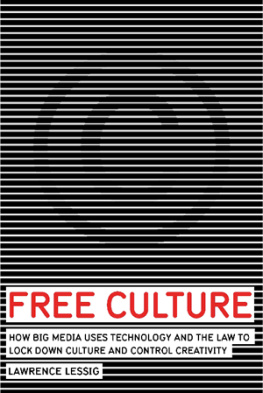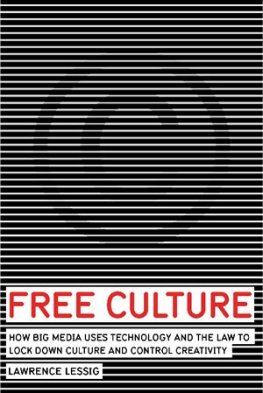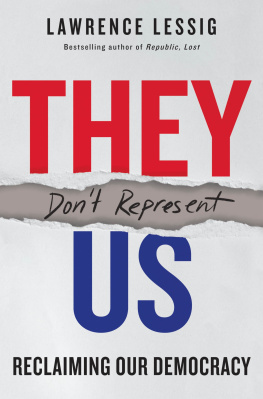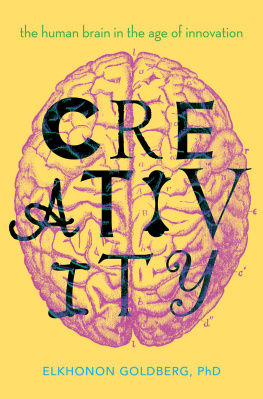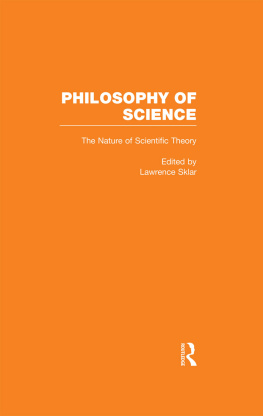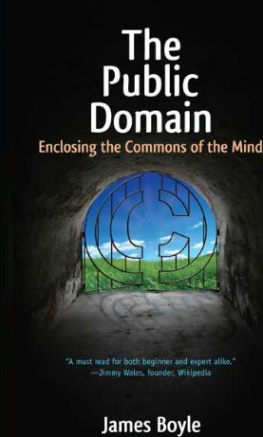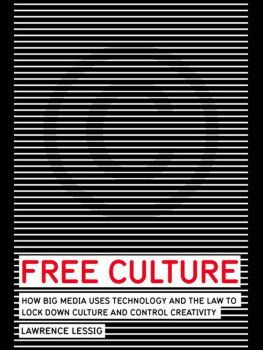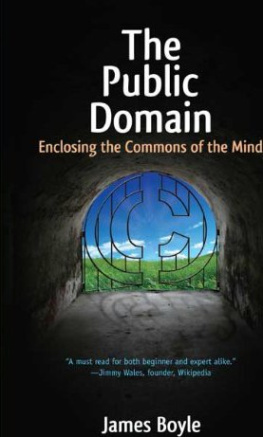Lawrence Lessig - Free Culture: The Nature and Future of Creativity
Here you can read online Lawrence Lessig - Free Culture: The Nature and Future of Creativity full text of the book (entire story) in english for free. Download pdf and epub, get meaning, cover and reviews about this ebook. year: 2005, genre: Romance novel. Description of the work, (preface) as well as reviews are available. Best literature library LitArk.com created for fans of good reading and offers a wide selection of genres:
Romance novel
Science fiction
Adventure
Detective
Science
History
Home and family
Prose
Art
Politics
Computer
Non-fiction
Religion
Business
Children
Humor
Choose a favorite category and find really read worthwhile books. Enjoy immersion in the world of imagination, feel the emotions of the characters or learn something new for yourself, make an fascinating discovery.
- Book:Free Culture: The Nature and Future of Creativity
- Author:
- Genre:
- Year:2005
- Rating:4 / 5
- Favourites:Add to favourites
- Your mark:
- 80
- 1
- 2
- 3
- 4
- 5
Free Culture: The Nature and Future of Creativity: summary, description and annotation
We offer to read an annotation, description, summary or preface (depends on what the author of the book "Free Culture: The Nature and Future of Creativity" wrote himself). If you haven't found the necessary information about the book — write in the comments, we will try to find it.
Free Culture: The Nature and Future of Creativity — read online for free the complete book (whole text) full work
Below is the text of the book, divided by pages. System saving the place of the last page read, allows you to conveniently read the book "Free Culture: The Nature and Future of Creativity" online for free, without having to search again every time where you left off. Put a bookmark, and you can go to the page where you finished reading at any time.
Font size:
Interval:
Bookmark:


Published: 2006
Categorie(s): Non-Fiction
Source: http://free-culture.cc
Lawrence Lessig (born June 3, 1961) is an American academic andpolitical activist. He is a professor of law at Stanford Law Schooland founder of its Center for Internet and Society. Lessig isfounding board member of Creative Commons and is a board member ofthe Electronic Frontier Foundation and of the Software Freedom LawCenter. He is best known as a proponent of reduced legalrestrictions on copyright, trademark and radio frequency spectrum,particularly in technology applications. At the iCommons iSummit 07Lessig announced that he will stop focusing his attention oncopyright and related matters and will work on political corruptioninstead. This new work may be partially facilitated through hiswiki Lessig Wiki which he has encouraged the public to use todocument cases of corruption. In February 2008, a Facebook groupformed by law professor John Palfrey encouraged him to run forCongress from California's 12th congressional district, the seatvacated by the death of U.S. Representative Tom Lantos. Later thatmonth, after forming an "exploratory project", the decision wasmade not to run for the vacant seat. Despite having decided toforgo running for congress himself, Lessig remained interested inattempting to change Congress to reduce corruption. To this end, heworked with political consultant Joe Trippi to launch a web basedproject called "Change Congress." In a press conference on March20, 2008, Lessig explained that he hoped the Change Congresswebsite would help provide technological tools voters could use tohold their representatives accountable and reduce the influence ofmoney on politics. Source: Wikipedia
http://www.feedbooks.com
Strictly for personal use, do not use this file for commercialpurposes.
Copyright 2004 by Lawrence Lessig. This version of FreeCulture is licensed under a Creative Commons license. This licensepermits non-commercial use of this work, so long as attribution isgiven. For more information about the license, click the iconabove, or visit http://creativecommons.org/licenses/by-nc/1.0/
At the end of his review of my first book, Code: And Other Lawsof Cyberspace, David Pogue, a brilliant writer and author ofcountless technical and computer-related texts, wrote this:
Unlike actual law, Internet software has no capacity to punish.It doesn't affect people who aren't online (and only a tinyminority of the world population is). And if you don't like theInternet's system, you can always flip off the modem.
Pogue was skeptical of the core argument of the bookthatsoftware, or "code," functioned as a kind of lawand his reviewsuggested the happy thought that if life in cyberspace got bad, wecould always "drizzle, drazzle, druzzle, drome"-like simply flip aswitch and be back home. Turn off the modem, unplug the computer,and any troubles that exist in that space wouldn't "affect" usanymore.
Pogue might have been right in 1999I'm skeptical, but maybe.But even if he was right then, the point is not right now: FreeCulture is about the troubles the Internet causes even after themodem is turned off. It is an argument about how the battles thatnow rage regarding life on-line have fundamentally affected "peoplewho aren't online." There is no switch that will insulate us fromthe Internet's effect.
But unlike Code, the argument here is not much about theInternet itself. It is instead about the consequence of theInternet to a part of our tradition that is much more fundamental,and, as hard as this is for a geek-wanna-be to admit, much moreimportant.
That tradition is the way our culture gets made. As I explain inthe pages that follow, we come from a tradition of "freeculture"not "free" as in "free beer" (to borrow a phrase from thefounder of the freesoftware movement ), but"free" as in "free speech," "free markets," "free trade," "freeenterprise," "free will," and "free elections." A free culturesupports and protects creators and innovators. It does thisdirectly by granting intellectual property rights. But it does soindirectly by limiting the reach of those rights, to guarantee thatfollow-on creators and innovators remain as free as possible fromthe control of the past. A free culture is not a culture withoutproperty, just as a free market is not a market in which everythingis free. The opposite of a free culture is a "permission culture"aculture in which creators get to create only with the permission ofthe powerful, or of creators from the past.
If we understood this change, I believe we would resist it. Not"we" on the Left or "you" on the Right, but we who have no stake inthe particular industries of culture that defined the twentiethcentury. Whether you are on the Left or the Right, if you are inthis sense disinterested, then the story I tell here will troubleyou. For the changes I describe affect values that both sides ofour political culture deem fundamental.
We saw a glimpse of this bipartisan outrage in the early summerof 2003. As the FCC considered changes in media ownership rulesthat would relax limits on media concentration, an extraordinarycoalition generated more than 700,000 letters to the FCC opposingthe change. As William Safire described marching "uncomfortablyalongside CodePink Women for Peace and the National RifleAssociation, between liberal Olympia Snowe and conservative TedStevens," he formulated perhaps most simply just what was at stake:the concentration of power. And as he asked,
Does that sound unconservative? Not to me. The concentration ofpowerpolitical, corporate, media, culturalshould be anathema toconservatives. The diffusion of power through local control,thereby encouraging individual participation, is the essence offederalism and the greatest expression of democracy.
This idea is an element of the argument of Free Culture, thoughmy focus is not just on the concentration of power produced byconcentrations in ownership, but more importantly, if because lessvisibly, on the concentration of power produced by a radical changein the effective scope of the law. The law is changing; that changeis altering the way our culture gets made; that change should worryyouwhether or not you care about the Internet, and whether you'reon Safire's left or on his right. The inspiration for the title andfor much of the argument of this book comes from the work ofRichard Stallman and the Free Software Foundation. Indeed, as Ireread Stallman's own work, especially the essays in Free Software,Free Society, I realize that all of the theoretical insights Idevelop here are insights Stallman described decades ago. One couldthus well argue that this work is "merely" derivative.
I accept that criticism, if indeed it is a criticism. The workof a lawyer is always derivative, and I mean to do nothing more inthis book than to remind a culture about a tradition that hasalways been its own. Like Stallman, I defend that tradition on thebasis of values. Like Stallman, I believe those are the values offreedom. And like Stallman, I believe those are values of our pastthat will need to be defended in our future. A free culture hasbeen our past, but it will only be our future if we change the pathwe are on right now. xv Like Stallman's arguments for freesoftware, an argument for free culture stumbles on a confusion thatis hard to avoid, and even harder to understand. A free culture isnot a culture without property; it is not a culture in whichartists don't get paid. A culture without property, or in whichcreators can't get paid, is anarchy, not freedom. Anarchy is notwhat I advance here.
Font size:
Interval:
Bookmark:
Similar books «Free Culture: The Nature and Future of Creativity»
Look at similar books to Free Culture: The Nature and Future of Creativity. We have selected literature similar in name and meaning in the hope of providing readers with more options to find new, interesting, not yet read works.
Discussion, reviews of the book Free Culture: The Nature and Future of Creativity and just readers' own opinions. Leave your comments, write what you think about the work, its meaning or the main characters. Specify what exactly you liked and what you didn't like, and why you think so.

